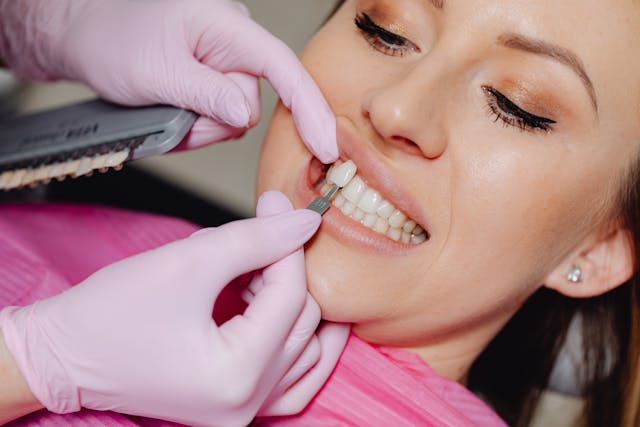
If you're unhappy with your smile, dental veneers might be the solution you've been looking for. Veneers can transform your teeth and give you the confidence to smile brightly. However, before deciding on veneers, it's essential to understand if they are the right choice for you. Here we will discuss who makes a good candidate for veneers and the factors to consider before making your decision.
Dental veneers are thin shells, typically made from porcelain or composite resin, that are custom-made to fit over the front surface of your teeth. They can change the colour, shape, size, or length of your teeth, giving you a perfect smile. Veneers are popular because they provide a natural look and can address various dental issues, such as discolouration, chips, or gaps.

Good candidates for dental veneers should have healthy teeth and gums. If you have cavities, gum disease, or other dental issues, these need to be addressed first. Healthy teeth provide a strong foundation for veneers, ensuring they last longer and function properly.
Veneers are ideal for people with minor cosmetic issues, such as stained, chipped, or slightly misaligned teeth. They can also be used to close small gaps between teeth. If you have severe dental problems, like significant misalignment or decay, other treatments might be more suitable.
A good candidate for veneers should have enough enamel on their teeth. The process of placing veneers involves removing a small amount of enamel to ensure the veneers adhere correctly. Without sufficient enamel, veneers may not bond properly, leading to potential issues.
Veneers require the same level of care as natural teeth. Good candidates must be committed to maintaining excellent oral hygiene, including regular brushing, flossing and dental check-ups. Neglecting oral care can lead to complications, such as gum disease or decay around the veneers.
If you grind your teeth, veneers might not be the best option for you. Grinding can put excessive pressure on the veneers, causing them to chip or break. If you have a history of teeth grinding, discuss this with your dentist. They might recommend a night guard to protect your veneers.
Veneers can be expensive, and they are often not covered by insurance because they are considered a cosmetic procedure. It's essential to understand the cost involved and ensure it fits within your budget. The price can vary depending on the material used and the number of teeth being treated.
While veneers are durable, they are not permanent. On average, veneers last between 10 to 15 years, after which they might need to be replaced. Consider the long-term commitment and potential future costs when deciding on veneers.
The process of getting veneers is irreversible because it involves removing a small amount of enamel. Once this enamel is removed, it cannot be replaced. Ensure you are confident in your decision before proceeding, as it is a long-term commitment.
Some people experience increased tooth sensitivity after getting veneers. This sensitivity is usually temporary, but it can be uncomfortable. Discuss any concerns about sensitivity with your dentist to understand how it might affect you.
Maintaining veneers requires diligence. Avoid biting into hard objects, such as ice or hard candy, as this can damage the veneers. Regular dental visits are essential to ensure your veneers stay in good condition and to address any issues promptly.
Dental veneers typically last between 10 to 15 years, depending on the material used and how well they are maintained.
No, veneers cannot be whitened. If you are considering veneers, it's best to whiten your natural teeth to your desired shade before getting veneers, as they will be color-matched to your teeth at that time.
If a veneer breaks, you should see your dentist as soon as possible. An emergency dentist can provide immediate assistance to fix or replace the damaged veneer.
Caring for veneers is similar to caring for your natural teeth. Brush twice a day, floss daily and visit your dentist regularly. Avoid biting into hard objects to prevent damage.
Not everyone is a good candidate for veneers. It's essential to have healthy teeth and gums, adequate enamel and a commitment to oral hygiene. Consult with your Rouse Hill dentist to determine if veneers are right for you.
Dental veneers can be a fantastic way to enhance your smile and boost your confidence. However, they are not suitable for everyone. It's important to have healthy teeth and gums, minor cosmetic issues and a commitment to maintaining good oral hygiene. Consider the cost, longevity, irreversibility, potential sensitivity, and maintenance before deciding on veneers. If you're still unsure, consult with your emergency dentist or your local Rouse Hill dentist to discuss your options and make an informed decision.








